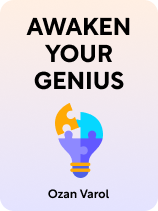

This article is an excerpt from the Shortform book guide to "Awaken Your Genius" by Ozan Varol. Shortform has the world's best summaries and analyses of books you should be reading.
Like this article? Sign up for a free trial here.
What’s your genius? What makes you special and unique in this world?
In Awaken Your Genius, Ozan Varol explores the concept of embodying your true self. He argues that connecting with your authentic desires and talents is key to living a fulfilling life. Varol offers insights on overcoming societal pressures and rediscovering your innate creativity.
Read more to uncover Varol’s techniques for rekindling your distinctiveness and becoming who you really are.
Who You Really Are
Varol argues that embodying your true self—what he calls your “genius”—is key to living your best life. So, who are you really? And what exactly does it mean to embody your true self? We’ll explain what your true self is and why it’s so valuable.
Varol suggests that your true self is the authentic, original, and creative version of yourself that emerges when you strip away outside influences. Your true self is what makes you great—nobody else is capable of taking up space in the world the way you do because no one is exactly like you. You have distinctive talents and interests; your personal history allows you to see things differently than others do, which gives rise to innovative ideas. This means your true self is innately creative—so embodying it allows you to infuse every undertaking with uniqueness.
According to Varol, embodying your true self makes your life more meaningful—you feel more freedom to explore the things that matter to you, you fulfill your creative impulses, and you make the world more beautiful by contributing something special to it. In contrast, when you’re disconnected from your true self, your opportunities for creative fulfillment and personal growth are limited. You spend your time on things that don’t matter to you, you feel bored or empty because you’re not creating, and the world misses out on what you have to offer.
| Your True and False Selves Varol argues that anyone can benefit from connecting with their true self, a sentiment that echoes the work of psychoanalyst D.W. Winnicott. In the 1960s, Winnicott theorized that everyone has a true and false self: The true self consists of your authentic desires, emotions, and potentials, and the false self is like a protective shell that develops in response to social influences. To illustrate, consider how you might tone down certain parts of your personality, like your love for practical jokes or tendency to rebel against authority, so you can exude an acceptable, professional image at work. Unlike Varol, Winnicott argued that both selves are valuable—embodying your true self is genuinely fulfilling, while embodying your false self helps you navigate societal demands such as politeness. However, Winnicot agrees with Varol that problems result when you over-identify with your false self and lose sight of your true self. For example, you may become more susceptible to peer pressure and harmful trends. You may also be more likely to experience an existential crisis, since you’re living a life that isn’t authentically fulfilling. Varol also argues that your true self is intrinsically creative. In Wired to Create, Scott Barry Kaufman and Carolyn Gregoire support this idea, arguing that creativity is not a trait but a set of cognitive and psychological skills that the human brain is designed to support. Daydreaming and mindfulness are examples of these skills: Daydreaming allows your mind to wander and make unexpected connections, while mindfulness helps you elicit meaning from impactful experiences. Like Varol, Kaufman and Gregoire also point to a relationship between creativity and a deep connection to self; they explain that fully engaging with and exploring your internal experience lays the bedrock for creative expression. |
How to Become Who You Really Are
Although being yourself is rewarding, Varol says that most people don’t embody their true selves because outside influences get in the way. We’ll discuss how you can stop abandoning your true self by pretending to be someone you’re not. Then, we’ll explain how to discover who you truly are.
Stop Abandoning Your True Self
Varol describes three forces that may have caused you to abandon your true self—conformity, consumption, and education—as well as counterforces that can help you overcome them. Let’s explore those forces and counterforces now.
Conformity
When you were a kid, Varol says, you wanted to fit in, so you conformed to others’ expectations and imitated their ideals. Then, you never stopped conforming. The ways you conformed became part of your identity—the collection of traits that you think define you, like your job, community, and belief system. Varol argues that your identity is an illusion that prevents you from seeing your true self, which is more complex than any identity could capture. Say you identify as a punk; the punk scene values rebellion and anti-establishment attitudes. This could restrict you from exploring anything perceived as mainstream, like classical music or entrepreneurship, even if it genuinely interests you, leading you to suppress your true self.
To overcome the pressure to conform, Varol recommends detaching from your identity. He says you can accomplish this by embracing open-mindedness, doubt, and nuance:
- Embracing open-mindedness involves becoming aware of your own biases, trying to understand others’ perspectives, and being willing to acknowledge when you’re wrong. For example, if you’re a punk, you might try recognizing the cultural value of pop music.
- Embracing doubt involves questioning your assumptions and beliefs, as well as those held by others who share your identity. For example, you might question the effectiveness of anti-establishment practices in the punk community.
- Embracing nuance involves recognizing that most issues are not black and white. For example, maybe you can be a punk and an entrepreneur.
Consumption
Varol argues that, in the digital age, you’re constantly tuned into others’ thoughts. You probably don’t go very long without consuming various forms of media, which consists of other people’s ideas. Additionally, Varol says the quality of the ideas you’re consuming is likely poor. Social media, news outlets, and entertainment often prioritize sensationalism and quick gratification over depth and originality. This flood of low-quality content can crowd out the space and time needed for deep thinking, reflection, and the development of your own ideas. You can’t access your true self when you’re preoccupied with others’ superficial selves.
Varol offers a few tips you can use to stop your media consumption from distracting you from your true self.
Consume media intentionally. According to Varol, you likely turn to certain forms of media impulsively, not intentionally—for example, you might scroll through social media whenever you’re bored. Take some time to consider the impact this has on your well-being—you might find that you waste a lot of time and energy on media that doesn’t help you. You might even find that it harms you by taking a toll on your mental health. This knowledge may motivate you to become more intentional about your media consumption.
Choose high-quality media. Varol says that you should choose reflective, longform media like books and documentaries over lower quality media like news, podcasts, and social media. The former tend to contain ideas worth serious consideration, while the latter are designed to grip your attention and keep you focused on frivolous things, like what your college roommate ate for lunch.
Create space to do nothing. Varol argues that instead of allowing others’ thoughts to flood your brain all day, you should create quiet moments that enable you to explore your own thoughts. During this time, you should do nothing—resist the urge to be productive and let your mind wander instead.
Education
Varol says you’ve been taught to repress your true self since you started school. In school, you experienced pressure to put aside your own interests and original ideas and learn to replicate the status quo. You were expected to memorize facts about the world instead of indulging in wonder and critical thinking. For example, you were probably taught that bees make honey without being encouraged to explore why this is true or question how this knowledge was discovered. This approach to education crushes your natural curiosity and diminishes your ability to think independently (which are two facets of your true self).
Since your education crushed your natural curiosity and discouraged you from thinking independently, Varol suggests that you reclaim these aspects of your true self using two techniques.
Discover your authentic interests. Varol explains that often, your authentic interests overlap with your talents. For instance, if you have a green thumb, you likely have an authentic interest in gardening. But you shouldn’t always stay in your comfort zone—by experimenting with new ideas and activities, you can discover new interests and hidden passions. For example, say you notice bees buzzing around your flowerbed and allow yourself to wonder about their behavior. This curiosity could lead you to explore beekeeping as a new hobby. Varol says that having a wide range of interests enhances your creativity, as you draw connections between different fields and experiences, and ensures that you always have something innately fulfilling to do.
Find out what you think about your interests. Once you discover your authentic interests, practice thinking independently about them. Say you’re curious about beekeeping. Before seeking outside information on the practice, take some time to explore your own ideas about it. What do you find intriguing about beekeeping? How do you think it works? Varol says this approach helps you engage deeply with your interests and develop a personal connection to them. You can then turn to outside sources—but don’t accept what they say as fact. Think about how their ideas compare to yours instead. According to Varol, this kind of deep, independent thinking is where innovative and meaningful ideas come from.
Discover Your True Self
Once you counteract the external influences (education, conformity, and consumption) that cause you to abandon your true self, you can discover who you truly are. Varol recommends that you focus on answering two questions: What makes you special, and what do you want out of life?
What Makes You Special?
As we’ve discussed, your true self is special. Now that you’ve developed greater self-awareness and new skills, like open-mindedness and independent thinking, you’re ready to figure out what makes you special. Varol shares two tips for accomplishing this.
Remember your child self. Think deeply about any strange qualities you exhibited as a child (or any childlike qualities you exhibit now). What do these qualities suggest about your unique skills or talents? For example, maybe you had (or still have) an inexplicable fascination with ancient Egypt or a talent for building intricate LEGO structures. These qualities could suggest that you have a natural inclination toward history or an aptitude for design and engineering. You can use this knowledge as a basis for exploration and discover how else you can apply your special skills.
Understand what’s special about you now. It’s tempting to replicate ideas and strategies that made you special in the past, but your current commitments and activities should reflect what makes you special now. Instead of repeating the past, Varol recommends that you reflect on your previous experiences, identify what worked for you then, and adapt those strategies to suit your current situation.
For example, maybe your childhood interest in ancient Egypt has morphed into a passion for writing historical fiction. It wouldn’t make sense to become an Egyptologist, even if that’s what you wanted as a kid, because you’ve changed too much over the years. But you can draw on your knowledge of ancient Egypt to infuse your historical fiction with authenticity and depth, creating narratives that uniquely reflect your current interests and perspectives.
What Do You Want Out of Life?
Once you know what makes you special, Varol says you can use that information to discover what you truly want out of life and then shape your life’s direction. Varol recommends making sure that your desires are aligned with what you know about your true self instead of aiming to achieve what others tell you is worthwhile. Most life advice is based on generalized assumptions about success and happiness—for example, your parents might advise you to pursue a business degree instead of an art degree because they value financial security. But, if your true self is an artist, taking their advice might stop you from fulfilling your creative potential.
For this reason, Varol recommends taking an avant-garde approach to success. This approach involves:
- Coming up with your own definition of success. As you zero in on what fulfills you, you might find that it doesn’t align with traditional markers of success. Varol says that’s OK—these markers are arbitrary, and you don’t need others’ approval to be successful.
- Seeing life as an endless experiment. Varol says the best way to determine what’s truly important to you is by experimenting with different career paths and other activities. It’s OK to repeatedly change course—always prioritize what matters to you right now.
- Defining a clear end goal. If you don’t, you won’t be able to recognize when you’ve achieved success. You’ll never feel fulfilled, and you’ll fall into the trap of always seeking more.
- Going off the beaten path. Varol says that in some cases, taking traditional paths forward won’t help you pursue your desires. Say you’re interested in an unconventional career, like ASMR artistry (a popular YouTube-based career). You may have to invent your own career path, since you can’t take traditional career steps like majoring in ASMR or interning at ASMR firms.

———End of Preview———
Like what you just read? Read the rest of the world's best book summary and analysis of Ozan Varol's "Awaken Your Genius" at Shortform.
Here's what you'll find in our full Awaken Your Genius summary:
- The reasons why you’ve abandoned your true self so far in life
- A former rocket scientist’s tips for embodying your true self
- How to achieve creative fulfillment and personal growth






